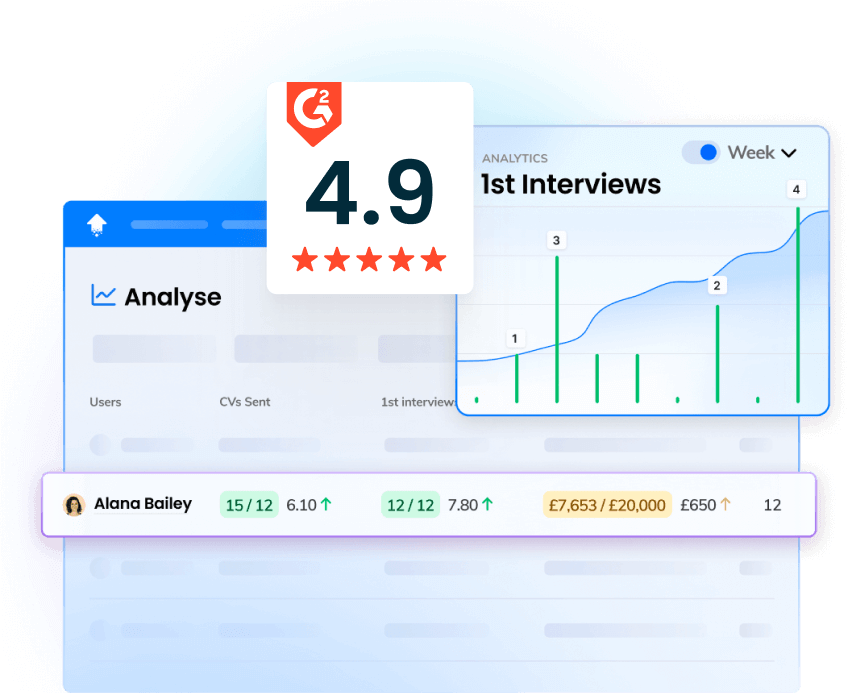Wondering how to start your own recruitment agency?
Maybe you're a top biller in your agency, and you're sick of so much of the money you make going to the CEO's pockets.
You may be a niche recruiter in your industry and have spotted a serious gap in the market.
Could you launch a new type of agency that innovates to do things differently?
Or maybe you want to run your own business, be your own boss, manage your own time, and make as much money as possible.
Indeed, there are many reasons to start your own successful recruitment agency — but the path to success isn't always smooth.
In this step-by-step guide, we'll take you through how to start a recruitment agency with actionable insights that set you up for success.
Step-by-Step Guide on How to Start a Recruitment Agency
Congratulations — you've decided to launch your own recruitment agency.
Here's where to start on this exciting adventure.
Step 1: Research Your Market
Getting your recruitment agency niche nailed down is vital to future success.
Specialising in a specific recruitment sector builds authority and trust with prospective clients.
A pharmaceutical tech company, for example, is much more likely to opt for an agency that specialises in that area than to opt for a general recruitment agency.
Furthermore, by niching down, your agency becomes truly embedded in that sector — networking with key industry players and building a pool of highly qualified specialised candidates.
Popular recruitment niches include:
- Technology
- Fintech
- Executive search
- IT
- Construction
- Marketing
- Recruitment
- Sales
- Healthcare
- Engineering
- Accounting
However, if you choose a specialism for which there is simply not that much demand or if you drill down to a niche that only applies to one or two companies worldwide, you're setting yourself up to fail.
Recruitment industry market research and competitive analysis are crucial to avoid such eventualities.
Once you've identified your potential niche, conduct in-depth research to discover market demand.
Look at market trends within that niche, identify potential customers, and find out how those potential customers currently run recruitment.
If there's a healthy demand, next take a look at your competitors.
Consider:
- Is the market already saturated?
- Which customers are competitors working with?
- What tactics are competitors using?
- How have competitors approached their employer branding
- How can you differentiate your agency from the competitors?
Check out OneUp's recruitment trends 2024 report to discover the state of the overall permanent recruitment market today.
Step 2: Meet Legal and Licensing Requirements
Now, it's time to get the legal stuff out of the way.
If you start your recruitment agency in the UK (for example), then the first step is to register your business on the UK government website.
In order to do this, you'll first need to decide whether to operate as a sole trader, limited company, or partnership.
The latter two options come with complex reporting and management responsibilities, so while you can set these companies up yourself, you may want to consult a professional such as an accountant or solicitor.
It is then a straightforward process to register your business.
Most recruitment agencies in the UK do not need a licence to operate.
However, agencies need to be licensed by the Gangmasters and Labour Abuse Authority (GLAA) if they provide workers for the following sectors:
- Agriculture
- Horticulture
- Shellfish gathering
- Forestry
- Food processing and packaging
Furthermore, nursing and domiciliary care agencies may need to register with the relevant regulatory body. Find out more here.
Step 3: Develop Your Business Strategy
This is an exciting time for any agency.
Your business is now official, and it's time to roll up your sleeves and get stuck into the details.
Start by creating a detailed business plan.
This should include:
- Defining your agency's vision, mission, and goals
- Planning out your business model, including your recruitment commission plan
- Deciding what service/s your agency will offer
- Creating a sales and marketing plan
- Forecasting financial projections
- Acquiring any necessary funding
- Developing risk assessment and mitigation strategies
Once your business plan is in place, setting up your financial management practices is next.
The first two priorities are setting up a business banking account and deciding who will be responsible for financial management within your agency.
But you should also consider:
- Budgeting for startup expenses
- Outsourcing your accounting
- Investing in financial software
- Pricing your recruitment services
- How recruiters will be paid
- How contractors will be paid
- How customers will pay you
- Choosing a pension scheme for employees
- Budgeting for other employee benefits
Step 4: Set Up Your Recruitment Agency's Infrastructure
Here's how to set up a recruitment agency.
Where will your recruitment agency operate from?
If you're starting with little budget or want to slash risk, a remote operation is likely the best option, at least in the initial growth phase.
But a slick city centre office space could help you attract both big-budget clients and top recruiters, so it may be a preferred option for agency owners with more cash to spend.
Of course, physical location is only the beginning.
The tech stack you choose is a crucial component of your recruitment agency infrastructure.
In 2024, recruitment agencies will need a powerful CRM, ATS, and recruitment analytics platform, at minimum.
While in the past, your CRM and ATS would typically be on separate platforms, today's sophisticated recruitment management systems (RMS) typically combine the two.
RMS recommendations include:
- Mercury, which provides CRM, automation, sourcing, and analytics all in one place. This tool is tailored towards medium and large businesses.
- JobAdder, with capabilities including CRM, recruitment marketing, applicant tracking, placement management, and recruitment operations.
- Vincere — an all-in-one CRM and ATS software designed with recruitment agencies in mind.
- Loxo, which combines CRM, ATS, outbound recruitment, data, and sourcing tools.
- Bullhorn's ATS and CRM which claims to be 40% faster than comparable systems and to help recruiters generate up to 43% more placements.
Recruitment analytics are at the heart of every decision in successful, modern agencies.
Every new agency needs to carefully identify the analytics software that best suits its purposes and will genuinely engage recruiters.
Old, clunky systems that require extensive, time-consuming manual input and a high level of data science expertise to operate will be an obstacle to becoming a data-first agency.
Recruitment analytics software OneUp promotes efficiency and effectiveness within agencies.

User-friendly and intuitive, it empowers recruitment leaders to motivate a recruitment team towards goals with custom dashboards, leagues, missions and more.
And with beautiful, easy-to-interpret data visualisations, OneUp engages recruiters with real-time data, supporting you in developing a high-performance culture.
OneUp pulls real-time data from across your existing tech stack and comes complete with automation functionalities, meaning it also drives efficiency and saves recruitment teams plenty of time.

Step 5: Build Your Brand and Online Presence
How do you want to present your agency to the outside world?
What do you want potential clients and candidates to think of you when they land on your website?
Building an attractive and authentic agency brand and online presence is vital for success for any new recruitment business.
The components that make up your brand identity include:
- Brand message
- Logo
- Colour scheme
- Style guide for written marketing copy
- Brand values
- Sales and marketing collateral
If you don't have a marketing expert already on board, it can be well worth outsourcing to ensure the above components look professional and have the desired impact.
Now, establish your online presence.
Create a professional website and establish your social media channels.
Again, if the budget is available, outsourcing a web designer and social media marketer will be a significant boon.
If not, there are plenty of easy-to-use website design platforms online with ready-made templates.
Check out:
All the different components of your brand identity, from your website and social channels to leaflets and logo, must all align with your brand values and with each other.
Step 6: Implement Effective Operational Processes
Your agency's processes are the backbone of day-to-day operations.
From the beginning, these processes must be designed with efficiency and productivity in mind.
Ineffective operational processes can cost your business significant time and money over the years.
In fact, they can make all the difference between a success and a failure.
Start with your recruitment and candidate management processes.
How are you going to manage candidates and placements efficiently?
How will candidates move from one stage of the recruitment funnel to the next, and what admin needs to be completed at each stage?
What touchpoints do you need to instil along the candidate journey?
Next, outline optimised client acquisition tactics.
What strategies will you use to attract and retain client businesses?
Step 7: Leverage Technology for Enhanced Performance
From day one, recruitment leaders must collect and analyse recruitment performance data to enable continuous improvement.
This means investing in advanced performance analysis tools like OneUp.

OneUp delivers the actionable insights needed to streamline operations and ensure recruiters are motivated to perform at their best.
The software pulls data from across your existing tech stack, meaning you can spend time on analysis and making data-backed decisions while implementing performance-based recruitment.
Instead of painstakingly building reports, you'll be diving into the recruitment activities behind your results — identifying positive tactics that should be replicated, and issues that require swift resolution.
At the touch of a button, you can visualise performance for top recruiting KPIs over any given period and track your targets in real time.
OneUp's automation functionality is a significant time-saver, with automated progress updates and reports.
Its custom dashboards empower self-management and drive accountability by ensuring data transparency across your team.
After setting your team and recruiters goals, you can build team and individual dashboards that show real-time progress towards goals. Use these to underpin every team meeting and one-to-one.
Does your team need a motivational boost?
Try OneUp's gamification features to engender healthy competition.
Set reps missions, competitions, challenges, and targets — and track their progress against colleagues on public leaderboards displayed on screens around the office.

Automate celebration anthems and public broadcasts for when recruiters hit their goals.
Step 8: Launch Your Operations
So how to open a recruitment agency?
This means kickstarting your carefully planned recruitment process.
Initiate your operations with your very first clients and candidates.
Ideally, you'll already have a handful of clients ready to go and a list of potential clients to reach out to with a strong sales pitch.
Meanwhile, your recruiters can set about discovering highly qualified candidates; browsing job boards, and networking in relevant communities.
From the very beginning of this process, implement a client and candidate feedback loop.
This could be done through online surveys or simply ensuring your recruiters regularly ask their contacts for feedback.
This feedback should be considered alongside your quantitative data when improving processes.
It should be an ongoing process to ensure continuous improvement as the market shifts and your agency grows.
Step 9: Scale Your Recruitment Agency
So your agency is up and running successfully, and you're hungry for growth.
It's time to explore growth strategies to expand your client base and see your agency enter new markets.
Consider the following:
- Expand into a market adjacent to your current specialism
- Regularly hire new recruiters or bring on board freelancers as new work comes in
- Regularly provide training to upskill recruiters in new areas
- Promote top recruiters into management positions to free up your time to scale up the agency
- Expand the geographical remit of your recruitment agency
- Leverage existing industry connections for new opportunities
- Network at industry events and conferences and in relevant online spaces
- Scale up your marketing efforts, targeting new types of businesses and candidates
- Expand your service offering for existing clients
Step 10: Navigate Challenges with Solutions
Every recruitment startup faces many challenges in its early months and years.
It's essential to have practical solutions ready to deploy should you encounter these obstacles.
Here are some of the most common startup recruitment agency challenges.
Lack of Budget
A tight budget is the single biggest challenge for most startups — but there are several ways to significantly cut costs in the early days.
The most effective way to cut costs is to start agency life as a remote business, using digital tools to significantly reduce overheads.
Remote work has many benefits, too — you can tap into a global pool of recruitment talent with different perspectives and skills.
It allows you to hire the best of the best rather than simply the best in your geographical location.
Cash-strapped companies no longer need to break the bank regarding marketing and advertising.
Social media platforms are a cost-effective way to showcase your startup to a broad audience with creative, professional content that grabs attention for all the right reasons.
Targeted advertising on social media platforms like Facebook and LinkedIn allows you to work with a tight budget while reaching a specific audience.
Develop mutually beneficial partnerships with local universities, colleges, industry organisations, and charities that help you tap into a wide pool of talent and network with potential clients.
The Need to Scale Rapidly
As your agency takes off, there may be too much work for your team to handle.
Not only will this negatively affect the quality of your work, but it can lead to employee burnout and high staff turnover.
However, as a startup, you may not immediately have the cash flow you need to bring new staff on board.
This is where you leverage technology to streamline your processes and employ AI and automation to save recruiters time.
Modern recruitment management systems can handle many of the tedious, repetitive tasks within your workflows, from screening CVs and collating the results of skills assessments to scheduling interview invitations and sending updates.
Meanwhile, leverage your recruitment analytics tools to resolve any time-wasting blockages within your recruitment funnel rapidly.
Lack of Brand Awareness
Launching your agency will feel like a massive deal to you, but very few people will be aware of your brand on day one.
However, thanks to the dawn of social media, it's much easier and cheaper to boost brand awareness than it once was.
Regularly share content on your social media channels that gives potential clients and candidates an insight into your agency.
Top content ideas for raising brand awareness include:
- Articles that give aspiring job seekers in your sector valuable advice on how to secure their dream role
- Blogs by the agency CEO stating their position on industry news
- Blogs that answer FAQs about your agency
- Photos and video content that gives viewers a glimpse into agency culture
- Articles and infographics that position you as a thought leader within your industry
- Collaborations with thought leaders and influencers within your sector
Remember to also engage with other relevant social media posts by liking, commenting, and joining in discussions.
Final Thoughts
To ensure success for your brand new recruitment agency, remember to:
- Conduct market research
- Meet legal and licensing requirements
- Develop your business strategy
- Set up your agency's infrastructure
- Build your brand and online presence
- Implement effective operational processes
- Leverage technology
- Launch operations
- Scale up your recruitment agency
- Proactively navigate challenges
Following these steps should ensure that, from day one, your agency is productive, efficient and effective.
Of course, leveraging sophisticated technology fit for 2024 is central to recruitment startup success.
If you're interested in finding out more about how OneUp can embed a high-performance culture within your new agency and facilitate continuous improvement, book a demo here today.




